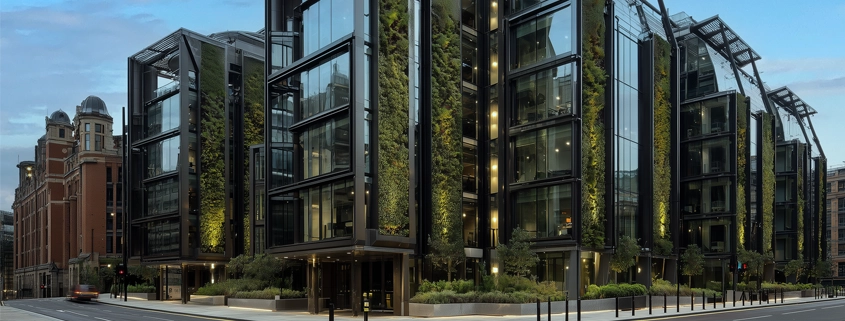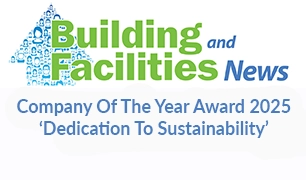Welcome to another Ask Adveco, where we respond to compliance for sustainability targets and transition to low-carbon water heating…
How does Adveco help customers navigate compliance with sustainability targets and government policies?
The value of expert advice should never be underestimated. Adveco works closely with building consultants, engineers and installers, helping design, supply or build systems ready for installation. We also commission projects to ensure the system is correctly and safely installed. Our manufacturer-grade warranty service ensures the application continues to operate as intended, so we continue to work with the owner/operator long after the building project is completed. Throughout this entire process, our expert engineers are on hand to advise and ensure systems are efficient and compliant. For new builds, this helps ensure planning approval is not only met but exceeded based on the sustainability specified for the building.
For renovation projects, Adveco can provide a low-cost, non-invasive and temporary metering service to accurately map hot water use in a building. This enables far more accurate sizing of a hot water system, ensuring the replacement design is maximised to address normal daily and peak demands. This aids the transition to more sustainable technology, which is tailored to actual needs. Water heating has for years been plagued with designs that under-size or, more commonly, over-size. So, they do not work properly, or in the latter case, you pay for more system than you need and pay more for their operation. With gas, this was written off as a sensible expense to ensure operational continuity. With an electric system, these costs are punishing, especially if the electrical demand of the building needs to be increased. That can potentially drive up project costs by hundreds of thousands of pounds. That can be avoided with live system data and theoretical modelling for correctly sized systems, which gives accurate oversight of daily and annual hot water demands, annual estimated energy consumption, carbon emissions and operational costs. This enables sustainability strategies to advance as planned, addressing compliance and meeting targets whether set by the business or mandated by the government.
What technologies or solutions does Adveco provide to help organisations reduce their carbon footprint?
There are a series of options available when it comes to more sustainable hot water. For existing commercial buildings, there remains a preference to remain on gas. Adveco continues to supply a wide range of commercial gas water heaters, the current generation of which offers extremely high efficiency matched by smart controls and monitoring. This enables appliances to reduce the amount of gas consumed, reducing carbon and nitrogen dioxide emissions. They also support natural gas, which can be blended with 20% hydrogen – a future technology expected to ultimately replace natural gas for commercial businesses from the mid-2030s through to 2050.
Although not strictly sustainable, these units can be seen as a bridging technology to truly sustainable systems, which retain the familiarity of gas-fired systems. They are very cost-effective to operate as long as gas remains cheaper than grid electricity, which is currently four times more expensive.
For those intending to retain gas services, energy use can be offset through the implementation of solar thermal as a pre-heat system, which offers a proven means to generate at least 30% of annual energy demand for water heating. Solar Thermal requires roof or wall-mounted collectors and employs gravity feed to transfer heat to the building’s domestic hot water (DHW) system. If used to offset more expensive electrical heating, solar thermal can currently provide a rapid return on investment.
For new build projects, building regulations mandate an all-electric approach to water heating unless demands are extremely high, in which case, new gas connections may be allowed under planning. Adveco supports this more sustainable option through a range of electric boilers, heat pumps, packaged hybrid systems, ready-to-install plant rooms constructed offsite and a complete solar thermal offering. We also offer the widest selection of cylinders, which essentially act as the battery of a hot water application, storing hot water to meet peak daily demands.
All these approaches can help meet sustainability targets today, demonstrating clear goals and actual investment in buildings.
We are a small London-based office and wondered if we can replace our gas water heater with a water cylinder and immersion?
As a high-temperature heat source, an electric boiler is capable of providing temperatures of up to 75°C and should be used in place of an immersion heater, as these are not designed for primary heating. Immersions are relatively costly to purchase and operate and prone to rapid limescale development and failure in hard water areas, so they should only be incorporated as a backup for additional system resilience. Specifying an electric boiler with a compact indirect cylinder is far more advantageous, preventing scale deposition, as well as delivering further system redundancy since the boiler will incorporate multiple immersions within its chassis.
What is the best approach for a low-carbon, low-cost domestic hot water system in a new build property?
In our opinion, the simplest approach blends preheat, such as from an Adveco ADV-W ASHP with, for example, the Adveco ARDENT electric boiler to supply thermal energy to a mains water-fed compact indirect cylinder. Balancing such a hybrid electric system is key to ensuring efficient operation, so consideration needs to be given to controls to ensure the water heating remains consistent and that the two technologies do not fight each other. Working in a balanced combination enables systems to be sized down by as much as half in terms of ASHP requirements. This delivers immediate capital savings as electric boilers are far less expensive compared to an equivalent heat pump. You also immediately reduce the physical size of the system, embodied carbon and demand from the electric supply.
If you have a question you would like answered by the team, feel free to send it to marketing@adveco.co, and we will aim to include it in future Q&As.
















